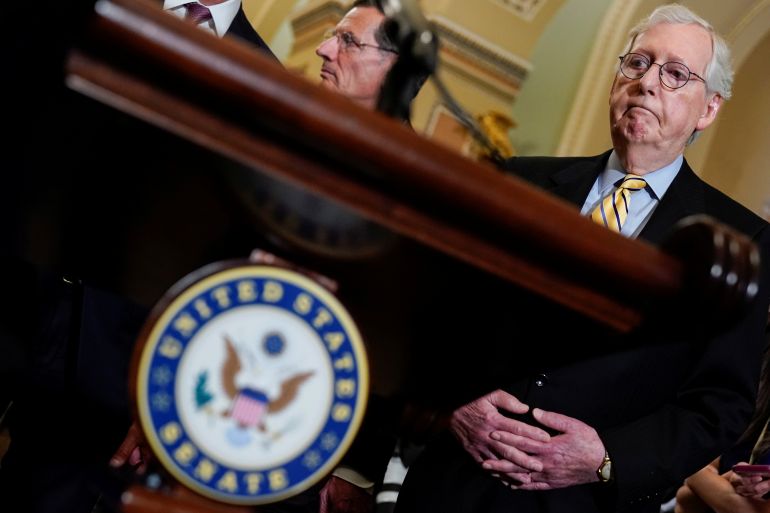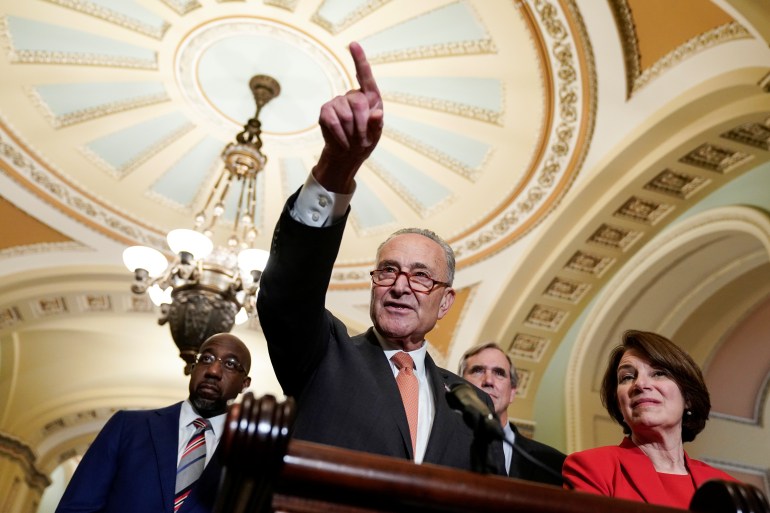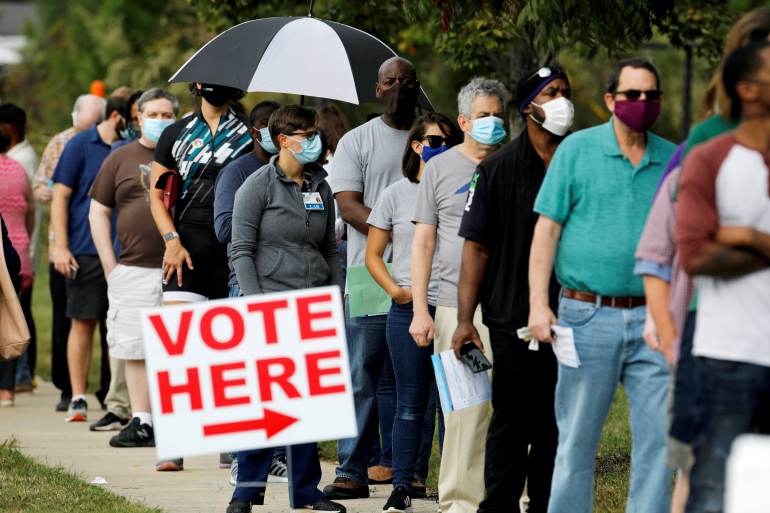US Senate Republicans block Biden-backed voting reforms
All 50 Republicans in the Senate stopped the effort by US Democrats to enact nationwide voting rights reforms.

Republicans in the United States Senate blocked debate Tuesday on sweeping election reform legislation proposed by Democrats and backed by President Joe Biden setting the stage for a confrontation between the two top political parties over US election law.
Senate Majority Leader Chuck Schumer had brought legislation titled For the People Act to the Senate for debate, a move that requires 60 senators to agree. Republicans, however, who control 50 of 100 Senate seats have lined up against the legislation. All 50 Republicans voted against opening debate.
Keep reading
list of 4 itemsVoting changes by US Republicans spark reaction from Justice Dept
After 2020 losses US Republicans move to limit voting rights
Biden signs order to promote US voting rights, access
“They don’t even want to debate it, don’t even want to debate it because they’re afraid,” railed Schumer in Senate floor remarks before the vote.
“They want to deny the right to vote, make it harder to vote for so many Americans. And they don’t want to talk about it, sweep it under the rug and hope that Americans don’t hear about it,” Schumer said.

After the final tally Tuesday evening, he said Republicans had cast their ballots in support of “the big lie” – the false claims by former President Donald Trump – that there had been widespread fraud in the 2020 election.
“This vote, I’m ashamed to say is further evidence that voter suppression has become part of the official platform of the Republican Party.
Schumer lauded that for the first time in this session that all 50 Democrats in the Senate had voted together, in favour of the reforms and that they would continue.
“The fight for voting rights is not over,” he said.
The For the People Act would have required all US states to implement automatic voter registration, offer voting by mail, and deploy new voting machines among other reforms.
Signalling the importance Democrats attach to the moment and the closeness of the evenly divided US Senate, Vice President Kamala Harris presided over the Senate for the vote on Tuesday night giving Democrats a 51-50 majority.

While the bill was sold by Democrats as an election integrity bill, Republicans opposed the measure as a federal overreach that would enhance Democrat’s political power and further undermine public confidence in US elections.
Importantly, the bill would roll back new voting restriction laws being passed in the Republican-controlled state legislatures that have sparked outrage among voting rights advocates.
Republican leader Mitch McConnell called the bill a “transparently partisan plan” by Democrats “to tilt every election in America permanently in their favour”.
“Today, the Senate will prevent this dangerous partisan takeover of our electoral system from moving forward,” said Senator John Thune, a leading Republican.
In a rare step to present-day politics, former President Barack Obama had given his backing to a bipartisan bid by Democratic centrist Joe Manchin to craft a compromise bill with Republicans. But McConnell and others had rejected that, too.
Republican legislators in politically significant US states have passed new voting restrictions following the 2020 election which saw record turnout.
“State legislatures … across the country are passing a wave of anti-voter laws based on the same repeatedly disproven lies that led to an assault on our nation’s Capitol,” White House press secretary Jen Psaki said referencing the January 6 attack on the US Congress by Trump supporters.
“They are putting these laws in place because they did not like the outcome and they have continued to perpetuate a lie about the outcome of the election,” Psaki said.
At least 14 states have enacted 22 new laws that restrict access to voting in a backlash to Biden’s 2020 election win on a record turnout.
Trump continues to claim without evidence the 2020 election was stolen even though courts have rejected his claims of fraud in key states for lack of evidence.
Republican “refusal to even allow debate on the For the People Act would be seen for what it is, a ringing endorsement for former President Trump’s conspiracy theories and his attacks on our elections, on reality itself”, said Senator Martin Heinrich, a Democrat.
Failure of the Senate to debate the bill will amplify talk in Washington about revising Senate “filibuster” rules to allow legislation to be brought up with fewer than 60 votes.
The Senate deadlock will place focus in public debate on new, more narrowly crafted voting rights legislation being developed by Black legislators in the US House of Representatives.